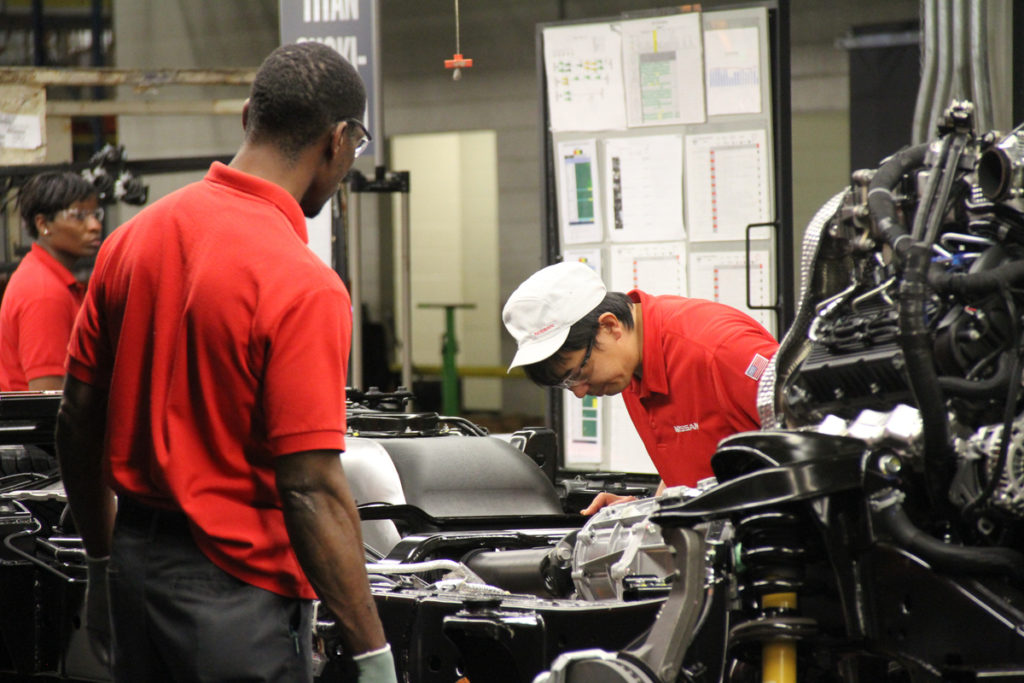
The United Automobile Workers just can’t seem to get a big win in the South. After years of organizing at a Nissan plant in Mississippi, the vote a week ago went down just like it had twice before at its flagship plant in Smyrna. The UAW claims worker intimidation is a big factor. But organizers are also having a hard time convincing folks they need a union when their jobs may already seem like the American dream.
An SUV moves down the assembly line Canton, Mississippi, as workers slap on side panels and seal up sunroofs. They’re in a clean, air conditioned plant making $20 to $25 an hour. And it’s a real step up for many.
“See, a lot of people come up in these areas where back in the day you did a lot of cotton picking and farming out in the fields,” says Jeffrey Moore, who was one of the first hired when Nissan opened its Canton plant.
As an organizer, it’s tricky when a colleague feels fortunate to have the job in the first place, he says.
“When you come up in a family that didn’t have much and you’re finally making that money that a lot of people wish that they could make, it really deterred a lot of folks from even wanting to support a union.”
Moore says it’s even harder when supervisors are going around telling people they might be out of work if the union comes in. He figures that changed a lot of minds for co-workers who signed union cards to initiate the Mississippi vote but had second thoughts in the secret ballot.
Of course, unions are in Moore’s blood. His dad was a postal worker and a labor leader. And this is a region where someone can go through life not knowing any card-carrying union members.
“I’m not saying that Nissan is not a good place to work,” George Dooley said
in a Facebook video directed at Nissan’s Mississippi workforce.
Dooley has worked at Nissan’s assembly plant in Smyrna for 25 years. He says he regrets his own vote against unionization in 2001. The UAW had already failed to organize the plant in 1989. Most recently, the union was unsuccessful getting plant-wide buy-in at Volkswagen in Chattanooga.
“The key is when you have a voice like what the union represents for the workers, you will have a better working experience. I’m a witness to that,” he said.
Nearing retirement, Dooley figures his pension would be more generous if someone had been bargaining on his behalf. But the epiphany may have come too late.
Republican politicians around the south like Tennessee Governor Bill Haslam are hoping the defeat in Mississippi means they can stop fending off the UAW.
“It was a fairly overwhelming vote, 2-to-1, that’s a pretty strong message,” he told reporters this week. “So do I think that’s good for automobile manufacturing growth in the Southeast and Tennessee? I do.”
Haslam says it certainly won’t hurt as
southern states try to land a plant jointly run by Toyota and Mazda that would create thousands of jobs.
The UAW is still trying to salvage its work in Mississippi,
lodging formal complaints that Nissan crossed the line in its anti-union campaign.
If the union plans to push for another vote elsewhere, Kane Plunkett is proof there’s convincing to do. He’s been on the job at Nissan’s Tennessee assembly plant for two years and says he’d be open to a union if they could get him more paid time off. But he doesn’t hear much good about the UAW.
“Most of the times it’s just bad, like they take money out of your paycheck. You have to have somebody there to talk to your supervisor,” he says. “The only thing they say is you get a bigger bonus or something, but I don’t know if that’s true.”
At 21 years old, Plunkett looks at his friends and feels like he’s got it pretty good.
That’s a fairly common mindset, says professor Dan Cornfield. He’s a labor expert at Vanderbilt University who says southern auto workers largely compare their economic status to their neighbors.
“The more the southern economy becomes linked to the global economy, then the focus of the average worker in the region will shift away from the local labor market conditions,” he says.
Cornfield says it may take another generation before people who build cars in the south are comfortable betting on the benefits of a union.


